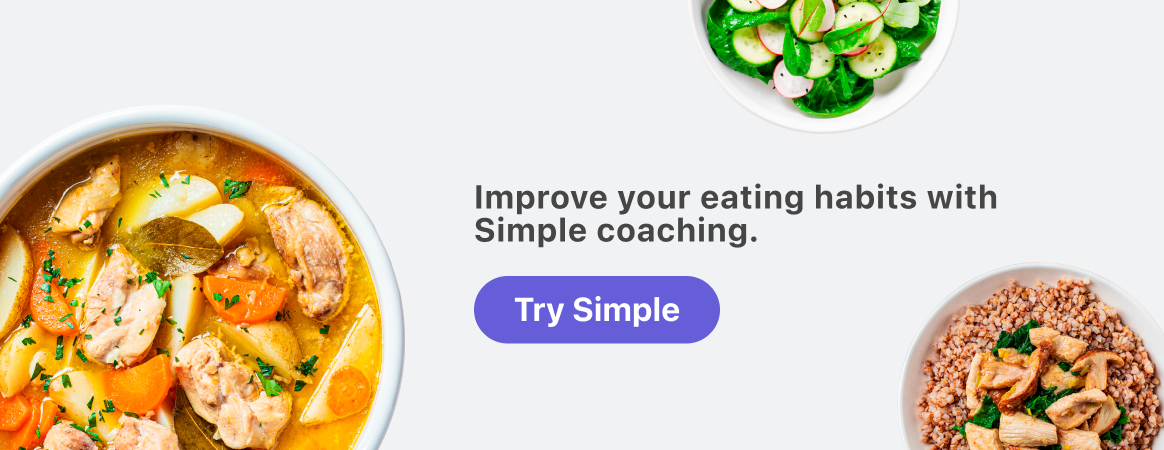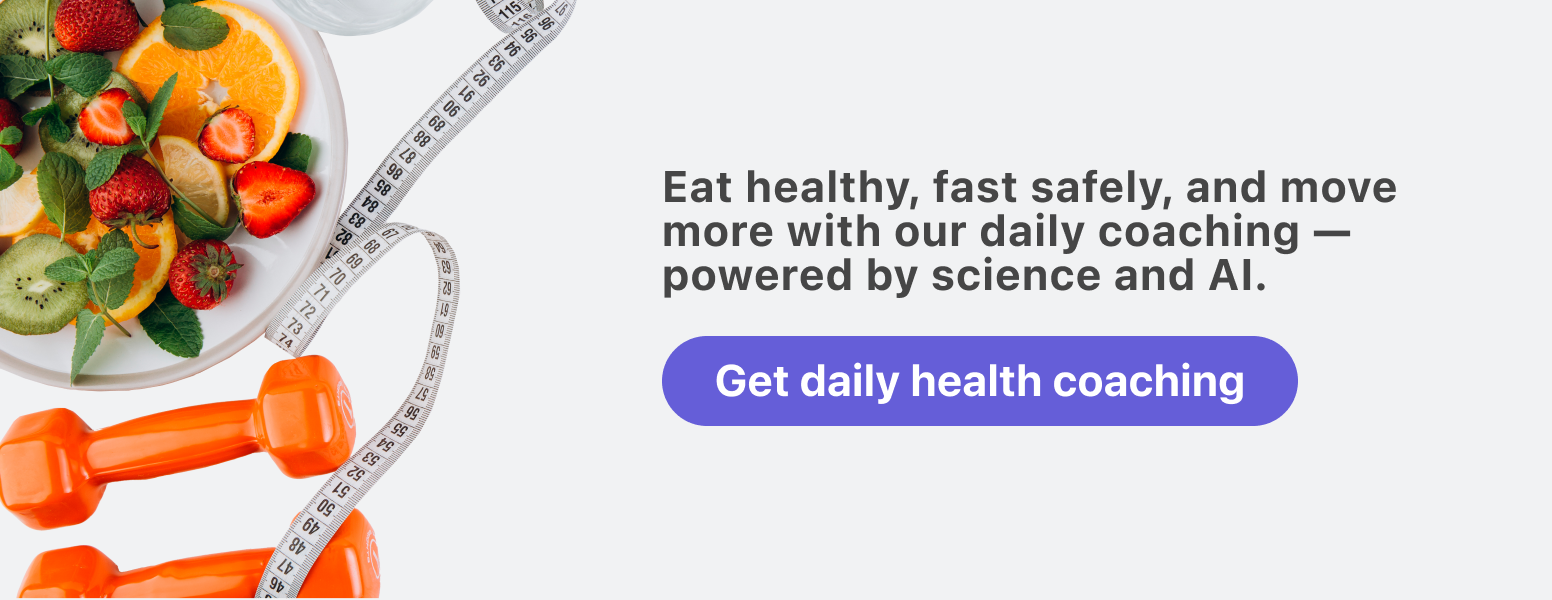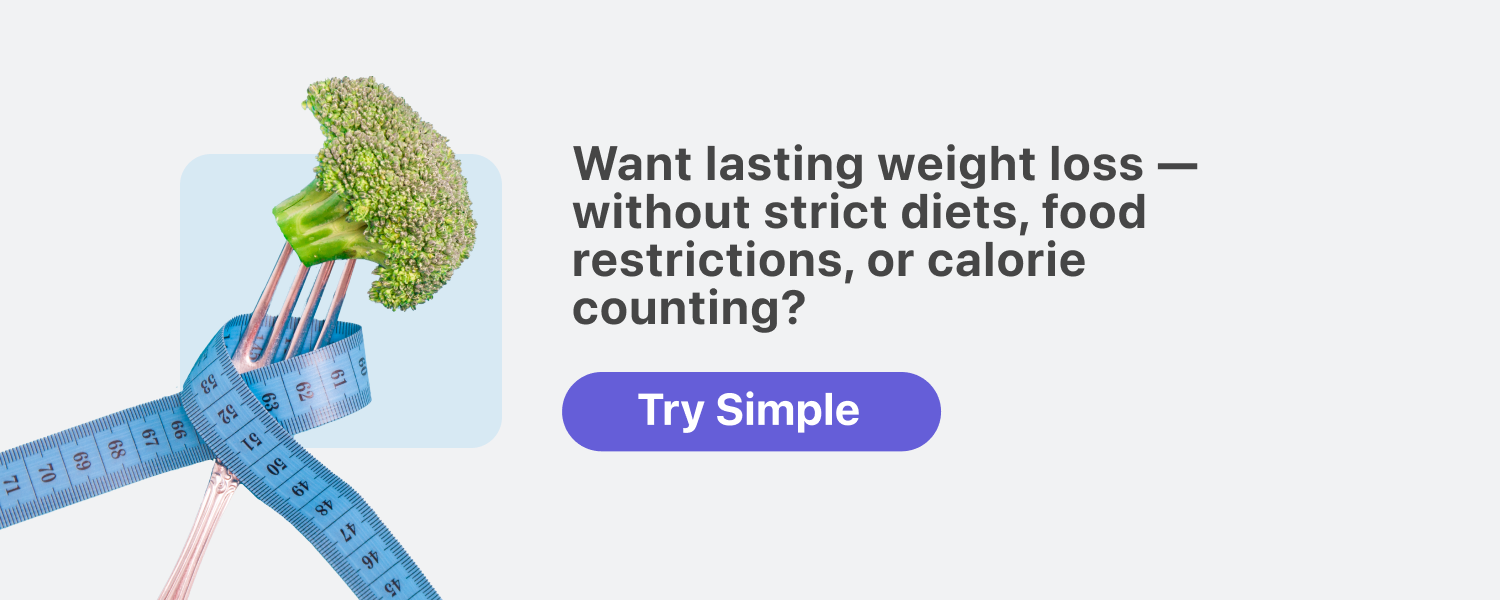How to start intermittent fasting — the basics and tips

It can be daunting to start something new. If you’re considering trying a fasting schedule to improve your eating habits, lose some weight, and get on a health kick, you might be anxiously thinking, “But how do I even start with intermittent fasting?”

Let’s take the worry and wonder out of the equation so you can get to feeling confident, calm, and in control. Here’s everything you need to know about how to start intermittent fasting.

How do you start intermittent fasting — the basics
Here are the basics on how to get started with intermittent fasting.
Step 1: Get familiar with how intermittent fasting works.
You don’t need to know the full history of intermittent fasting or the ins and outs of every possible schedule. We’ll get into all the important stuff later, but for now, all you need to know is this:
- Intermittent fasting is when you alternate between periods of eating and fasting.
- The schedule you choose will dictate how long you’ll fast and how many hours you’ll have to fit in your meals and snacks.
- It’s flexible, and you can adjust it to suit your life no matter how busy or unpredictable it may be!
Step 2: Choose your fasting schedule.
There are various ways to structure your intermittent fasting. At Simple, we like time-restricted eating (TRE) schedules, like 12:12 and 18:6, best.
The right TRE schedule for you will emerge as you practice. Our best suggestion is to start with 12:12 to get your feet wet and see how it feels. As you get more experienced, you’ll be in a better position to explore the other intermittent fasting options, like 14:10, 16:8, and 18:6.
If 12:12 feels like too much, too soon, no worries. Simply shorten your current eating window by 1–2 hours (or however much you’re comfortable with) to slowly increase the time between your last meal today and your first meal tomorrow.
Step 3: Consult your doctor.
It’s always a good idea to check with your doctor before making a big change to how you eat, especially if you have a history of diabetes, heart disease, or any other medical condition. They know you and your health history, so they’ll be well-placed to ensure you’re safe to start.
One extra note here: we don’t recommend fasting if you’re currently pregnant or breastfeeding, as you’ll have higher nutritional requirements that fasting can make difficult to meet. (You are supporting a little human in growing and developing, after all!)
How do I know if I’m doing it right?

Here are some hallmarks of intermittent fasting done right so you can check if you’re on the right path.
You fast for 12–18 hours (depending on your chosen schedule).
This means you don’t eat or drink anything that contains calories for the length of your fasting window. (Check out our guide for the full lowdown on what breaks a fast.)
You consume all your calories for the day within 6–12 hours (depending on your chosen schedule).
Everything you eat and drink to nourish and energize your body, mind, and spirit fits into your eating window.
You stick to your fasting schedule every day.
Nothing here is set in stone, obviously — if you skip a day or choose to fast only on certain days of the week, nothing bad will happen! However, to get the best results from intermittent fasting, consistency is important, so shoot for daily if you can.
Your body responds.
When you fast intermittently, you can expect your body to change in some way as a result:
- You may notice improvements in your energy levels throughout the day.[1]
- You may feel more in control of your appetite.[2]
- You may respond better to insulin, especially if you have a history of insulin resistance.[3]
- You may feel more empowered to make healthier food choices.
- Your digestion may improve (more studies are needed to say for sure).[4]
- You may lose weight or inches from your body.[5]
- You may sleep better.[5] (Again, more research is needed to say for sure.)
- Your blood pressure and/or cholesterol may drop especially if you are living with overweight or obesity.[6]
Of course, this will be personal to you. Figure out what’ll tell you that your fasting is going well and track those things.
Sometimes, it’s easier to tell if you’re doing it right from how it looks if you’re doing it wrong! With that in mind, here are some intermittent fasting mistakes we commonly see (no judgment here; these are easy traps to fall into).
- You eat when you should be fasting
Yup, hunger and cravings can lead you astray! This may be a sign that you have chosen a fasting schedule that’s too demanding or that you’re not eating enough during your eating window, so check in with yourself to see what to adjust.
- You fast when you should be eating
The temptation to undereat — especially if you’re a lifelong dieter — can be super strong.[7] Intermittent fasting does rely on fasting … but it relies just as much on you eating what your body needs during your eating window. Nourish that bod!
- You get dehydrated
Drinking enough is imperative when you’re intermittent fasting because you’ll likely be eating less. When you eat less, you’re also getting less water (because the food we eat gives us about a third of the fluid we need daily). So, ladies, aim for 9 cups a day, and guys, shoot for 8–11.[8]
If you notice any symptoms of dehydration — like headaches, fatigue, or dizziness — that last longer than 24 hours or become unbearable, speak to your healthcare provider.
- You quit when results are slow
Painful but true fact: results are slow. Even if you’re doing everything right. Even if you’re 100% committed and all your actions are on point. Bodies change slowly. Hang in there.
At first glance, all this might seem like a lot — so much to think about and avoid! We’re here to help. Take our Simple quiz and set your fasting schedule on the app. From Day 1, we’ll load up articles and insights to help you complete your fasts like a pro.
How to choose the best intermittent fasting schedule for you
When considering how to start a fasting lifestyle, choosing the intermittent fasting schedule that’s right for you is high on the list. Here are some things to factor in.
Your daily routine
Which fasting schedule best aligns with your work schedule, social commitments, and personal preferences? Think about when you need food and when food fits into your routine best.
For instance, if you start work early and finish late, maybe regular meals throughout the day are important to give you the energy to keep going. 12:12 or 14:10 could be your friend here. Or, perhaps skipping breakfast and starting your day with lunch is easy for you, but missing dinner with your family is unthinkable. Here, 16:8 intermittent fasting or even 18:6 could work well.
Your goals
Different fasting schedules work well for different goals.
12:12 and 14:10 are perfect for getting started and into the rhythm of fasting regularly. They can help you eat more intentionally, snack less after dinner, and feel more in control of your eating habits.
16:8 and 18:6 have been studied more and shown to yield various health and wellness benefits, including weight loss, especially for people who are living with overweight or obesity.[1] If you’re eager to make strides in those areas, these would be the options to go for (or work toward).
Your hunger and energy
For some people, shorter fasting periods are more tolerable, particularly when getting started with intermittent fasting. For others, longer fasts are no problem. Experiment and listen to your body to find the schedule you can manage from a hunger and craving POV that still allows you to eat enough for sustained energy.
Most popular intermittent fasting schedules to start with
At Simple, we’re big fans of time-restricted eating (TRE), like the 12:12, 14:10, 16:8, or 18:6 intermittent fasting schedules. They give plenty of results while allowing enough space for proper nourishment and care of your body. Plus, they’re pretty popular with both starters and advanced fasters.
Other intermittent fasting schedules exist, like the 5:2 diet and alternate-day fasting, which we’d recommend you speak with your doctor before trying.
There are also fasting schedules like Eat Stop Eat, water fasting, dry fasting, and OMAD, which aren’t worth the risk. They’re pretty taxing on the body without bringing any more benefit. 20:4 intermittent fasting, aka the Warrior Diet, also falls into this category.
Whichever intermittent fasting schedule you choose, make sure fasting is safe for you first.
10 tips for a successful start to intermittent fasting

1. Start slow
Start with a 12-hour fast and a 12-hour eating window. Practice that till it’s comfortable. Then, if you need more, build to 14:10 and beyond. Many people stop at 16:8 because it gives them the results they’re looking for, but where you land is your choice. The point here: there’s no rush. Take your time.
2. Eat for your goals
Whether you’re fasting to lose weight or improve your health overall, what you eat matters. Your food choices can either work with — or against — what you’re trying to achieve.
Let’s figure out what you should eat during intermittent fasting. In a nutshell, the goal is to eat more foods that support better health, pumped-up energy, and sharp thinking (plus weight loss, if you’re fasting to lose weight), like:
- lean proteins — chicken, fish, tofu, and legumes
- whole grain carbohydrates — grains including quinoa, oats, and wholemeal rice or pasta
- veggies and fruits
- calcium-rich foods — milk and other dairy foods, dairy-free enriched milk, including almond milk fortified with calcium
- healthy fats — avocados, unsalted nuts, and oily fish like salmon
Ask yourself:
Within each of these categories, what are some foods you like? If you don’t know — or your list of “likes” is pretty limited at the moment — no worries. Explore a little. Then notice the impact of eating more of these foods on your goals. Do they move you closer or further away?
If you need help making better food choices, take our Simple quiz and use our app to support your intermittent fasting. When you log your food each day, we’ll make suggestions to improve what you’re eating!
3. Cut out breakfast
One quick tip for how to start intermittent fasting is to see how late you can make your breakfast.
Try getting distracted in the morning with an activity you enjoy (or that’s engaging, at least), and see if you forget about food for a while. Set a timer to make sure you don’t go too long, though — life takes energy, and energy comes from food! Listen to your body on this one. If it doesn’t feel good, take a pass on this tip.
4. Find the best time for you to work out
Yes, you can work out AND be an intermittent faster!
It takes a little trial and error to find the right spot for your workout in your day. Again, experiment here — your body may surprise you by feeling strong and energetic while fasting, or you might be able to lift harder and run faster when you’re fully fed.
5. Watch out for your snacking urges
One of the cool things about intermittent fasting is how it may shine a light on your snacking habits and what drives them.
If you start your fast after dinner, as many people do, you may find yourself craving a post-dinner cookie or bowl of ice cream. But you’re not hungry, and your appetite is satisfied, so … what gives?
Is it simply a habit? Is it stress? Are you bored? Get curious about this, and you’ll uncover information about your food choices that will be all kinds of useful.
6. Drink coffee and tea
What can you drink while fasting? All the calorie-free versions of tea, coffee, and water you can think of!
That’s yes to lemon water, but no to coconut water. Yes to ginger tea, but no to bubble tea. Yes to black coffee with no sugar, but no to cappuccinos.
While you’re fasting, tasty-yet-zero-calorie beverages can hold you over nicely.
7. Drink a lot of water!
Yes, it sounds boring, and you’ve heard it a million times, but drinking enough water makes a real difference in the quality of your life.
When you’re fasting, being sufficiently hydrated helps ward off hunger and cravings and may help you lose weight, too.[9]
8. Get fired up
Understanding your motivation — the why behind starting your intermittent fasting journey — will help you get focused and dialed in.
Take a moment to reflect on what drives you. What are your goals and aspirations? Are you looking to lose weight? Improve your blood sugar levels? Boost your energy?
Once you know that, add the rocket fuel: WHY? What difference will achieving these goals make to your life? Keep asking why till you get to the real, emotional nub of what’s pushing you to change.
Then write all that down so it can power you forward day to day — especially when the road gets rough.

9. Go easy on yourself
When you’re making a big change — like adopting an intermittent fasting schedule to improve your nutrition habits — you can expect some bumps along the way.
In other words, sometimes you’ll [whispers] fail.
And that’s OK. If it all goes wrong one day, pick yourself up and try again. (Feel free to have a little cry, too, if it helps.)
10. Think beyond nutrition
The way you live your life will have a domino effect on what you eat and vice versa. For instance:
- how much sleep you’re getting
- how you’re managing stress
- how active you are
- how supportive (or not) your social relationships are
- how your environment is designed (or not) to support healthy choices
- how you talk to and about yourself
All can influence what you eat, how you eat, your ability to manage your hunger and cravings, and how easy (or not) it is to change your behaviors.
No need to tackle everything all at once, but when you’re feeling in the swing of intermittent fasting, see if you can make some improvements in other areas, too.
Pros and cons of intermittent fasting
Like any approach to improving nutrition habits, intermittent fasting has its pros and cons. Let’s take a look.
| Pros | Cons |
| Flexible and easy to follow | Can increase hunger and cravings |
| Can lead to weight loss | Possibility of nutrient deficiencies |
| Fasting can be convenient | Fasting may feel too restrictive |
| Improved insulin sensitivity | May interfere with work / social life |
Pros
Weight management
Intermittent fasting can be an effective tool for weight loss or weight maintenance in healthy adults and adults living with overweight or obesity.[6] Limiting your eating window can help create a calorie deficit, leading to fat loss. Fasting can lead to ketosis, where the body burns its fat stores for energy.
Improved insulin sensitivity
Intermittent fasting may improve insulin sensitivity,[3] which can help regulate blood sugar levels and reduce the risk of developing type 2 diabetes.
Flexibility
Intermittent fasting doesn’t require specific foods or complicated meal plans. You can tailor your food choices, meal plan, and meal timings to fit your life.
Convenience
Having a shorter eating window could mean fewer meals to prepare and eat, simplifying your daily routine, saving you time, and making meal planning easier.
Cons
The newbie stage
During the initial stages of your fasting journey, you may find the hunger challenging. You might feel headachy, grouchy, dizzy, or fatigued. It might be hard to hang on for the length of your fast. Those first couple of weeks can be uncomfortable, but they don’t last forever!
That said, if any of these symptoms persist or become unbearable, get this checked by your healthcare provider.
Nutrient deficiencies
If fasting causes a reduction in your daily calories due to the shortened eating window,[10] it may be more challenging to meet your daily nutrient requirements.
Social challenges
Following a fasting schedule may make social events tricky, especially when food is involved. Tricky but not insurmountable with planning and forethought!
It can feel restrictive
Some studies (mainly in adolescent girls [11] and young women [12]) show intermittent fasting may be both a trigger and a symptom of disordered eating. Though research in this area is still quite limited, if you struggle with or have a history of disordered eating, we don’t recommend fasting.
Should you have any concerns about your eating habits, please talk to your doctor or seek immediate support.[13]
Is intermittent fasting safe?
For most people, intermittent fasting is safe, but it’s not safe for everyone. Those for whom intermittent fasting is best left alone unless they have the blessing and full support of their doctor are people who:
- have a medical condition
- are under 18 or 80 or older
- have a body mass index (BMI) <18.5
- are extremely active
- take prescription medications
- are pregnant, breastfeeding, or trying to conceive
- have (or are at risk of having) an eating disorder or have a history of one
Intermittent fasting potential side effects
Intermittent fasting has a few potential side effects, like:
- hunger
- lightheadedness
- headaches
- fatigue
- irritability, etc.
These can be worked through with time and practice, thoughtful meal planning, and making adjustments to your fasting as needed. That said, if they hang around for longer than a couple of days, stop fasting and see your doc.
A beginner should start intermittent fasting by choosing the fasting schedule they feel most confident with, taking it slow and steady, and listening to their body. Check out more tips for how to start intermittent fasting here.
Whether you should skip breakfast or dinner during intermittent fasting is really up to you! What fits your lifestyle best?

- Keenan S, Cooke MB, Chen WS, Wu S, Belski R. The Effects of Intermittent Fasting and Continuous Energy Restriction with Exercise on Cardiometabolic Biomarkers, Dietary Compliance, and Perceived Hunger and Mood: Secondary Outcomes of a Randomised, Controlled Trial. Nutrients [Internet]. 2022 Jul 26;14(15).
- Kucuk B, Berg RC. Alternate day fasting on subjective feelings of appetite and body weight for adults with overweight or obesity: a systematic review. J Nutr Sci. 2022 Oct 31;11:e94.
- Yuan X, Wang J, Yang S, Gao M, Cao L, Li X, et al. Effect of Intermittent Fasting Diet on Glucose and Lipid Metabolism and Insulin Resistance in Patients with Impaired Glucose and Lipid Metabolism: A Systematic Review and Meta-Analysis. Int J Endocrinol. 2022 Mar 24;2022:6999907.
- Llewellyn-Waters K, Abdullah MM. Intermittent fasting – a potential approach to modulate the gut microbiota in humans? A systematic review. Nutr Healthy Aging. 2021 Jul 5;6(2):87–94.
- McStay M, Gabel K, Cienfuegos S, Ezpeleta M, Lin S, Varady KA. Intermittent Fasting and Sleep: A Review of Human Trials. Nutrients [Internet]. 2021 Oct 1;13(10).
- Patikorn C, Roubal K, Veettil SK, Chandran V, Pham T, Lee YY, et al. Intermittent Fasting and Obesity-Related Health Outcomes: An Umbrella Review of Meta-analyses of Randomized Clinical Trials. JAMA Netw Open. 2021 Dec 1;4(12):e2139558.
- Memon AN, Gowda AS, Rallabhandi B, Bidika E, Fayyaz H, Salib M, et al. Have Our Attempts to Curb Obesity Done More Harm Than Good? Cureus. 2020 Sep 6;12(9):e10275.
- Institute of Medicine, Food and Nutrition Board, Standing Committee on the Scientific Evaluation of Dietary Reference Intakes, Panel on Dietary Reference Intakes for Electrolytes and Water. Dietary reference intakes for water, potassium, sodium, chloride, and sulfate. Washington, D.C., DC: National Academies Press; 2005. 638 p.
- Muckelbauer R, Sarganas G, Grüneis A, Müller-Nordhorn J. Association between water consumption and body weight outcomes: a systematic review. Am J Clin Nutr. 2013 Aug;98(2):282–99.
- G Engel M, J Kern H, Brenna JT, H Mitmesser S. Micronutrient Gaps in Three Commercial Weight-Loss Diet Plans. Nutrients [Internet]. 2018 Jan 20;10(1).
- Stice E, Davis K, Miller NP, Marti CN. Fasting increases risk for onset of binge eating and bulimic pathology: a 5-year prospective study. J Abnorm Psychol. 2008 Nov;117(4):941–6.
- Stice E, Gau JM, Rohde P, Shaw H. Risk factors that predict future onset of each DSM-5 eating disorder: Predictive specificity in high-risk adolescent females. J Abnorm Psychol. 2017 Jan;126(1):38–51.
- Eating disorder hotlines for 24/7 crisis help [Internet]. Eating Disorder Hope. 2012 [cited 2023 May 26].
